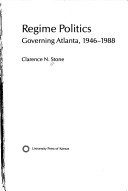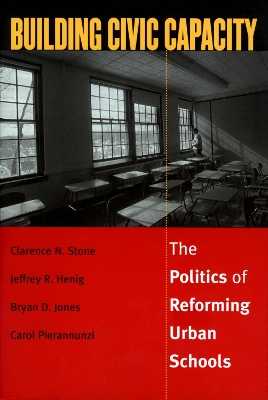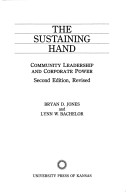Studies in Government and Public Policy
5 total works
While retaining a critical distance from rational choice theory, author Clarence Stone finds the problem of collective action to be centrally important. The urban condition in America is one of weak and diffuse authority, and this situation favors any group that can act cohesively and control a substantial body of resources. Those endowed with a capacity to promote cooperation can attract allies and overcome oppositional forces.
On the negative side of the political ledger, Atlanta's style of civic cooperation is achieved at a cost. Despite an ambitious program of physical redevelopment, the city is second only to Newark, New Jersey, in the poverty rate. Social problems, conflict of interest issues, and inattention to the production potential of a large lower class bespeak a regime unable to address a wide range of human needs. No simple matter of elite domination, it is a matter of governing arrangements built out of selective incentives and inside deal-making; such arrangements can serve only limited purposes. The capacity of urban regimes to bring about elaborate forms of physical redevelopment should not blind us to their incapacity to address deeply rooted social problems.
Stone takes the historical approach seriously. The flow of events enables us to see how some groups deploy their resource advantages to fashion governing arrangements to their liking. But no one enjoys a completely free hand; some arrangements are more workable than others. Stone's theory-minded analysis of key events enables us to ask why and what else might be done. Regime Politics offers readers a political history of postwar Atlanta and an elegant, innovative, and incisive conceptual framework destined to influence the way urban politics is studied.
Building Civic Capacity
by Clarence N. Stone, etc., Jeffrey R. Henig (Professor of Political Science and Department Chair, George Washington University, USA), Bryan D Jones, and Carol Pierannunzi (Professor of Political Science and International Affairs, Kennesaw State University, USA)
Drawing upon an ambitious eleven-city study funded by the National Science Foundation, the authors synthesize and make sense of the enormous amount of data from Atlanta, Baltimore, Boston, Denver, Detroit, Houston, Los Angeles, Pittsburgh, St. Louis, San Francisco, and Washington, D.C. Not only is this a vivid report from the front lines of big city schooling, but this work challenges us to rethink our approach to the crisis in our schools.
The authors vigorously contend that it is essential for all (or most) important actors in an urban community to join together in a shared vision of what is wrong in the schools and how to fix it, and to pursue that vision strongly and systematically over a long time. That can only happen, however, if those same actors develop the ability and willingness to set aside narrow aims and opportunistic behavior in favor of pursuing the collective good.
Written for a wide spectrum of potential readers--including educators, social scientists, policymakers, and every citizen who cares about his or her child's education--this book restores coalition politics to the center of educational reform and reminds us to look well beyond pedagogy and management theory for solutions to problems that are immune to the usual remedies. Drawing on select cases, the authors show that effective civic coalitions can be built. The struggle for reform can be won.
In this significantly revised update, Bryan Jones and Lynn Bachelor have extended and refined their analysis of Detroit-area automakers and political leaders negotiating the selection of new factory sites (and thus the addition of thousands of jobs to the local economy). Their thorough revision develops a crucial new concept--solution sets--updates all plant location decisions reported in the first edition, and adds an instructive new case study--the Chrysler Jefferson Avenue plant in Detroit.
This book seeks to uncover the linkages between business leaders(motivated by profit) and political decision makers (motivated by electoral gain) by examining the responses of public officials in three Michigan "auto cities"--Detroit, Flint, and Pontiac--to plant-location choices made by General Motors and Chrysler. Throughout, the authors focus on three issues-the relationship between the local industrial economy and the local political system, the structure of urban politics, and the degree of independence of political decision makers in urban affairs.
As Jones and Bachelor show, urban regimes, in their efforts to shore up sagging economies, develop characteristic solution-sets that are applied almost routinely to superficially similar situations. In fact, they contend, it's rare for a regime to start with a problem and search for a policy solution. Instead, through a pattern of interactions among politicians, business executives, labor unions, and other interested parties, a "package" of problem-definitions and preferred solutions emerges. But if applied indiscriminately, these solutions can become dysfunctional, which in turn may attract new participants to the policy process and ultimately alter the regime's character.
"An excellent case analysis of urban political economy. . . interesting, sophisticated, well written. It is sure to be widely discussed."--Clarence N. Stone, author of Urban Policy and Politics in a Bureaucratic Age and Economic Growth and Neighborhood Discontent.
"This new version makes significant new contributions to both the urban politics and public policy literatures, and indeed marries them in an utterly unique way. The concept of solution sets is brilliant, and I assume that it will be much discussed and utilized in the urban literature."--Dennis Judd, author of The Politics of American Cities: Private Power and Public Policy.
Praise for the first edition:
"An excellent book. The authors demonstrate a considerable capacity for theoretical innovation and a rare appreciation of the detail and complexity of local economic development. This book is a model for those who would like to situate the local economic development process in a more general analytical framework."--Urban Studies
"A provocative addition to the literature"--Choice
City Schools and City Politics
by John Portz, etc., Lana Stein (Associate Professor of Political Science, University of Missouri, St Louis, USA), and Robin R. Jones
Other writers have chronicled the often catastrophic effects of these shutdowns on urban workers and their communities. John Portz is the first to provide an in-depth look at what local governments have done--and can do--to cope with these crises.
Portz combines a rich synthesis of the literature on urban politics and political economy with a close analysis of plant closings in Pittsburgh, Louisville, and Waterloo, Iowa, to illuminate the complexity of, constraints upon, and range of city government's efforts to control the economic damage caused by shutdowns.
When U.S. Steel attempted to close its plant near Pittsburgh, local governments in the area banded together to form the Steel Valley Authority and went head-to-head with corporate headquarters. A less aggressive stance was taken by the city officials of Waterloo, who tried to offset the effects of a meatpacking plant shutdown through creative financing and consensus-building among government, union, and company officials. In Louisville, crisis resolution efforts were dominated by private market forces, institutions, and individuals--the city government was relegated to the role of bystander.
Although the actions taken by the three city governments varied widely, all three cases illustrate both the dilemmas imposed upon the dependent city by a plant closing and the potential for creative and effective solutions.
"Will have a definite impact on the field of urban scholarship."--Bryan Jones, coauthor of The Sustaining Hand: Community Leadership and Corporate Power.
"A significant and very well written study that has much to tell us about local government's role in industrial policymaking."--Lawrence E. Rothstein, author of Plant Closings: Power, Politics, and Workers.
"Portz uses the best available theoretical literature on urban politics and makes it come alive with compelling case studies. Readers both inside and outside the academic world will benefit from his analysis of why and how local governments respond to plant closings."--Sanford F. Schramm, coauthor of "Plant Closing Legislation and Issues" in Deindustrialization and Plant Closings.




